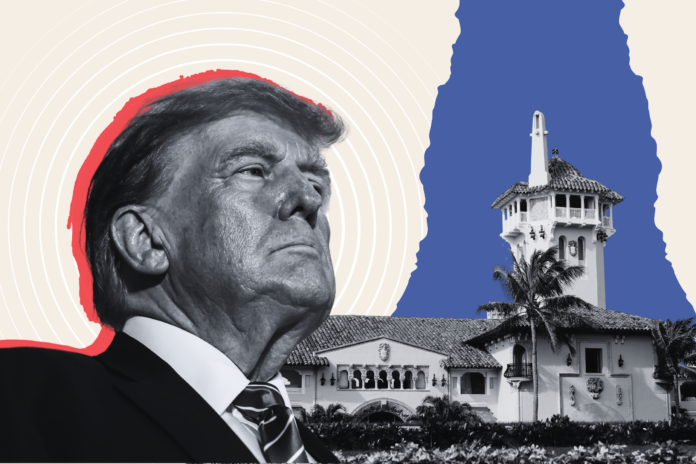As the critical deadline of March 25 looms closer, Donald Trump is facing the increasingly likely possibility that the New York attorney general might start seizing and liquidating his assets—a threat which might lead him to sell some of his properties to raise the huge amount needed to pay the bond.
But not even the sale of his famed Florida luxury resort, Mar-a-Lago, would be enough to help him, experts told Newsweek.
In a court filing on Monday, Trump’s lawyers said that the former president faced “insurmountable difficulties” to raise the bond of more than $464 million he owes to New York State in a civil fraud lawsuit launched by Letitia James. According to the lawyers, the former president spent “countless hours negotiating with one of the largest insurance companies in the world” and tried to raise the money from at least 30 private companies, but he was unsuccessful.
“The bonding companies have never heard of such a bond, of this size, before,” Trump said in a statement.
Photo-illustration by Newsweek/Getty
To raise the money necessary to pay the bond, Trump could look into liquidating his capital assets, Todd Landman, professor of political science in the School of Politics and International Relations at the University of Nottingham, told Newsweek—an option that looks less than ideal at the moment.
“There is the probability of the less than ideal price any asset may garner owing to the need for a quick sale,” he said. “This means that the total money generated from the liquidation of capital assets would be much lower than the sale price.”
According to Landman, Trump could liquidate assets in New York and Chicago while, “as a point of pride, brand, and psychology, Mar–a-Lago would be last in the list of assets under consideration,” he said, adding that “selling Mar-a-Lago alone would not generate enough money for the total amount payable.”
“Mar-a-Lago is a highly valuable piece of property, but it is not valued highly enough to cover that entire obligation,” Brad Hunter, of real estate market research and consulting firm Hunter Housing Economics, told Newsweek.
According to Hunter Housing Economics research, the transaction volume of multimillion-dollar homes in the town of Palm Beach has slowed in the past 12 months.
“Mar-a-Lago sits on 17 acres and extends from the Intracoastal Waterway to the Atlantic Ocean, making it a singular asset. It is worth $375 million, in my opinion,” Hunter said.
“It could take a long time to find a buyer and get access to those proceeds, because that is a rarified part of the market,” he continued.
“There are very few people in the world with the resources to buy such a property, so the search for that buyer could take months or a year or more. Even then, the net proceeds would fall short of the $464 million figure. It may be possible to shorten the time-on-market if the property were marketed lower than this $375 million figure.”
As Mar-a-Lago is not for sale—and the Trump family has never expressed the wish to put it on the market—it’s hard to determine its value. In late 2022, Ken Johnson, associate dean of graduate programs and a real-estate economist at Florida Atlantic University, told Newsweek that the average property in Palm Beach has appreciated 180 percent since 1996—and Mar-a-Lago is likely to have exceeded that appreciation.
Newsweek contacted Trump lawyer Alina Habba’s office for comment on the options being levied by Trump by email early on Wednesday.
If Trump isn’t able to offer a financial guarantee by next Monday, the state’s attorney general would be allowed to start collecting on the money the former president owes the state as the result of James’ lawsuit.
In February, the judge overseeing the case, Justice Arthur Engoron, ordered Trump to pay $355 million, plus interest, for inflating the value of his assets to obtain more favorable terms from banks and insurers. He also banned him from serving in top roles in any New York business for three years.
Uncommon Knowledge
Newsweek is committed to challenging conventional wisdom and finding connections in the search for common ground.
Newsweek is committed to challenging conventional wisdom and finding connections in the search for common ground.


